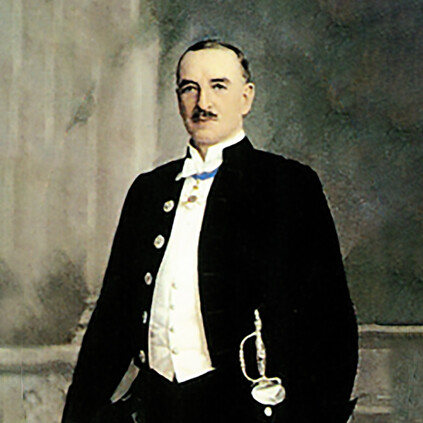About The C. Alma Baker Charitable Trust
OUR PURPOSE
‘The furtherance of the science of agriculture; the advancement of education; and such other charitable purposes as the Trustees shall from time to time think fit.’
A Vision for the Future: The Charitable Trust's reason for being.
The Charitable Trust awards are for those focusing on the fields of agriculture, agritech, and the study of rural society.
Oversight of the Limestone Downs operations is undertaken by the C. Alma Baker Trust (NZ) Ltd, which comprises a Board of up to 6 members. This Board forms the Officers of the Trust.
More information on The Charitable Trust and its history is provided below.
WHO IS C. ALMA BAKER?
Meet the Trust's namesake - Charles Alma Baker.
HISTORY OF THE TRUST
Learn about the Trust's history and its long affair with the advancement of agriculture and education.
Who is Charles Alma Baker?
THE HISTORY OF THE C ALMA BAKER CHARITABLE TRUST
From London to Oamaru and then the Federated Malay States, Charles Alma Baker was a businessman, trained surveyor and investor. An early adopter of the biodynamic farming movement his love for the land, investment, science and agriculture lives on in the C Alma Baker Charitable Trust.
Charles Alma Baker was born in 1857 in Oamaru, New Zealand, where his parents, migrants from London, built the town’s first hotel. Trained as a surveyor, Baker moved to the Auckland province where he continued in his professional employment and married Florence, daughter of Sir Frederick Whitaker, a prominent businessman and former Premier of New Zealand.
In 1890, Baker moved to Batu Gajah in Perak, one of the Federated Malay States. There, he quickly accumulated a modest fortune through a surveying monopoly over the Kinta Valley which was then the focus of extensive tin mining and rubber adding to his already considerable wealth. Baker also invested in these industries.
By the early 20th century, Baker held the largest privately owned rubber plantations in the Federated Malay States. On his plantations and in other agricultural ventures, Baker developed an interest in the preservation and enhancement of soil quality, and in the nutritional value of foods, later becoming a supporter of the early movement for biodynamic farming.
strong believer in King and Empire, Baker was a prominent fundraiser for the Royal Flying Corps during the First World War, raising funds in Australia and Malaya for the purchase of 94 aircraft. For this work he received the CBE in 1919.
Financially secure, Baker effectively retired after the War, travelling the world, avoiding winters, and pursuing his interest in fishing. For the first time in more than thirty years, his travels brought him back to New Zealand where he became an enthusiast for the developing sport of game-fishing at the Bay of Islands and for trout-fishing on the Tongariro River. It was he who persuaded Zane Grey to visit New Zealand in 1926.
On his 1926 visit to New Zealand, Baker embarked on a farming venture with his nephew, Eric Baker, who was clearing land south of Port Waikato on the west coast of the North Island. As well as buying a controlling interest in Eric’s property, Baker bought the large adjoining property which he called Limestone Downs. Over the next 15 years, even during the Depression, Baker invested heavily in these properties which then totalled some 4,800 hectares (12,000 acres).
After his death in 1941, Charles Alma Baker’s estate was managed for the benefit of his daughter, Mrs Judy Pottinger. With Baker’s generous contributions to the war effort, again for the purchase of aircraft for the Royal Air Force, the loss of rubber income and property damage arising from the Japanese occupation of Malaya, and death duties, the Trustees had little choice after the War but to sell part of the rubber plantations and realise other assets. However, they retained Limestone Downs, recognising its potential as a long-term investment. When Mrs Pottinger died childless in 1976, the trustees of Baker’s estate decided to make Limestone Downs the cornerstone of a trust that would ensure the achievement of the intent of Baker’s will – ‘the furtherance of the science of agriculture’ and wider charitable purposes.
With the agreement of the Charity Commissioners for England and Wales, Baker’s executors formed the C. Alma Baker Trust in 1981 after discussion with representatives of Massey University facilitated by the late Hon. Les Gandar, former Minister of Education and Chancellor of Massey University and, at a critical stage, New Zealand’s High Commissioner in London. The new Trust had the aims of ‘the furtherance of the science of agriculture; the advancement of education; and such other charitable purposes as the Trustees shall from time to time think fit’.
Linkages between the United Kingdom and New Zealand remained central to the Trust’s activities. Overall control of the Trust, and activities in the United Kingdom, was in the hands of ‘the British Trustees’.
For the management of Limestone Downs and Trust activities in New Zealand, the Trustees appointed a ‘New Zealand Committee’ which included up to three persons proposed to the Trustees by the Vice-Chancellor of Massey University.
Reflecting this close partnership, farm management, administrative and financial services were provided for the Trust by the University until 1997 and since 1981 university staff have been involved in significant on-farm research projects.
In its early years, the Trust concentrated on the re-development of Limestone Downs and defined a range of activities that it would fund as financial returns from the property became available. Agricultural research has been a priority, with particular emphasis on seeding grants for new projects and the encouragement of new researchers. In addition, there have been a range of scholarships and funds for travel that supports agricultural research and educational linkages between New Zealand and the United Kingdom.
In 2006, fundamental changes were made to the constitution of the Trust. In the United Kingdom, the Trust became a charitable company, limited by guarantee. The former “New Zealand Committee”, which had administered Limestone Downs and made recommendations to the Trustees concerning Research Awards, Scholarships, Fellowships, and Charitable Grants, was reconstituted as C. Alma Baker Trust (NZ) Ltd, wholly owned by the United Kingdom-based trust, and administered by a Board of Directors. In both cases – Trustees and Directors – membership was as before, providing continuity in Trust affairs.
In 2021, the UK Trustees agreed to pass ownership of Limestone Downs to a new New Zealand entity, the C. Alma Baker Charitable Trust, which retained the same charitable objectives as the UK-based Trust. The new Trust and the UK Trust remain linked through the Young Farmer scheme, with the UK Trust being responsible for the selection of candidates and Limestone Downs being responsible for hosting these young farmers.





